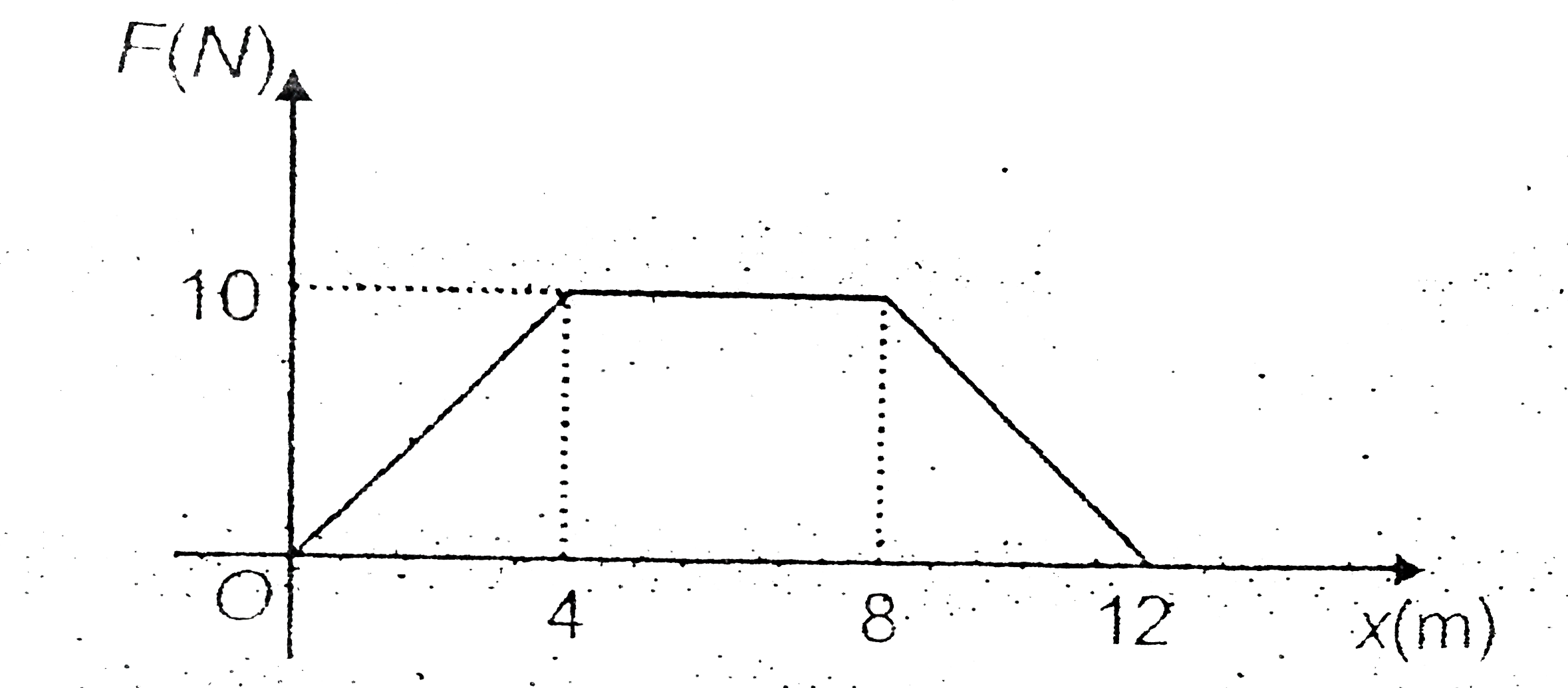A particle of mass 0.5kg travels in a straight line with a velocity v=(5x5/2)m/s. How much work is done by the net force during the displacement from x=0 to x=2m ?
To find the work done by the net force during the displacement from x=0 to x=2m for a particle of mass 0.5kg with velocity given by v=5x5/2m/s, we can use the work-energy theorem, which states that the work done is equal to the change in kinetic energy of the particle.
1. Calculate the initial velocity at x=0:
v1=5⋅05/2=0m/s
2. Calculate the velocity at x=2:
v2=5⋅25/2
First, calculate 25/2:
25/2=(25)1/2=321/2=4√2
Now substitute this back into the equation for v2:
v2=5⋅4√2=20√2m/s
3. Calculate the initial kinetic energy KE1:
KE1=12mv21=12⋅0.5⋅02=0J
4. Calculate the final kinetic energy KE2:
KE2=12mv22=12⋅0.5⋅(20√2)2
Calculate (20√2)2:
(20√2)2=400⋅2=800
Now substitute this back into the equation for KE2:
KE2=12⋅0.5⋅800=200J
5. Calculate the change in kinetic energy:
ΔKE=KE2−KE1=200J−0J=200J
6. Conclusion: Work done by the net force:
According to the work-energy theorem, the work done by the net force is equal to the change in kinetic energy:
W=ΔKE=200J
Final Answer:
The work done by the net force during the displacement from x=0 to x=2m is 200J.
v1=5⋅05/2=0m/s
v2=5⋅25/2
First, calculate 25/2:
25/2=(25)1/2=321/2=4√2
Now substitute this back into the equation for v2:
v2=5⋅4√2=20√2m/s
KE1=12mv21=12⋅0.5⋅02=0J
KE2=12mv22=12⋅0.5⋅(20√2)2
Calculate (20√2)2:
(20√2)2=400⋅2=800
Now substitute this back into the equation for KE2:
KE2=12⋅0.5⋅800=200J
ΔKE=KE2−KE1=200J−0J=200J
According to the work-energy theorem, the work done by the net force is equal to the change in kinetic energy:
W=ΔKE=200J
The work done by the net force during the displacement from x=0 to x=2m is 200J.
Topper's Solved these Questions
- WORK, ENERGY AND POWERBOOK - PRADEEPCHAPTER - WORK, ENERGY AND POWEREXERCISE - Conceptual Problems
27 Videos
- WORK, ENERGY AND POWERBOOK - PRADEEPCHAPTER - WORK, ENERGY AND POWEREXERCISE - Very Short Anwer Question.
54 Videos
- WORK, ENERGY AND POWERBOOK - PRADEEPCHAPTER - WORK, ENERGY AND POWEREXERCISE - Curiosity questions
2 Videos
- THERMODYNAMICSBOOK - PRADEEPCHAPTER - THERMODYNAMICSEXERCISE - Assertion- Reason Type Questions
19 Videos
Similar Questions
A particle of mass 0.5kg travels in a straight line with velocity v=ax3/2 where a=5m−1/2s−1. What is the work done by the net force during its displacement from x=0 to x=2m?
View SolutionA particle of mass m moves on a straight line with its velocity varying with the distance traveled. Find the total work done by all the forces during a displacement x=0 to x=d if the velocity is equal to (a) v=λ√x and (b) v=λx is constant.
View Solution
Knowledge Check
A body of mass 0.5 kg travels in a straight line with velocity v=5x3/2. The work done by the net force during its displacement from x=0 to x=2 m is
A50JB45JC25JDnone of theseA body of mass 0.5kg travels in a straight line with velocity v=ax3/2 where a=5m/s2. The work done by the net force during its displacement from x=0 to x=2m is
A1.5JB50 JC10 JD100 JA body of mass 0.5 kg travels in a straight line with velocity v=kx3/2 where k=5m−1/2s−1. The work done by the net force during its displacement from x=0 to x=2 m is
A1.5 JB50 JC10 JD100 J
A particle of mass 0.5 kg is subjected to a force which varies with distance as shown in figure

1. The work done by the force during the displacement from x=0 to x=4andx=4 to x=12are respectively
(1)20J,40J(2)40J,40J(3)20J,60J(4)40J,80J
2. The increaase in kinetic energy of the particle during its displac ement from x=0 to x=12 m is
(1)20J(2)40J(3)80J(4)120J
3. If the speed of the particle at x=0 is 4 m/s, its speed st x=8 m is
(1)8m/s(2)16m/s(3)32m/s(4)4m/s
View SolutionA body of mass 0.5 kg travels in a straight line with velocity v=kx3/2 where k=5m−1/2s−1. The work done by the net force during its displacement from x=0 to x=2 m is
View SolutionA body of mass 0.5 kg travels in a straight line with velocity v=kx3/2 where k=5m−1/2s−1 What is the work done by the net force during its displacement from x = 0 to x = 2 m?
View SolutionA particle of mass 2kg travels along a straight line with velocity v=a√x, where a is a constant. The work done by net force during the displacement of particle from x=0 to x=4m is
View SolutionA body of mass m travels in a straight line with a velocity v=kx3/2 where k is a constant. The work done in displacing the body from x=0 to x is proportional to:
View Solution
